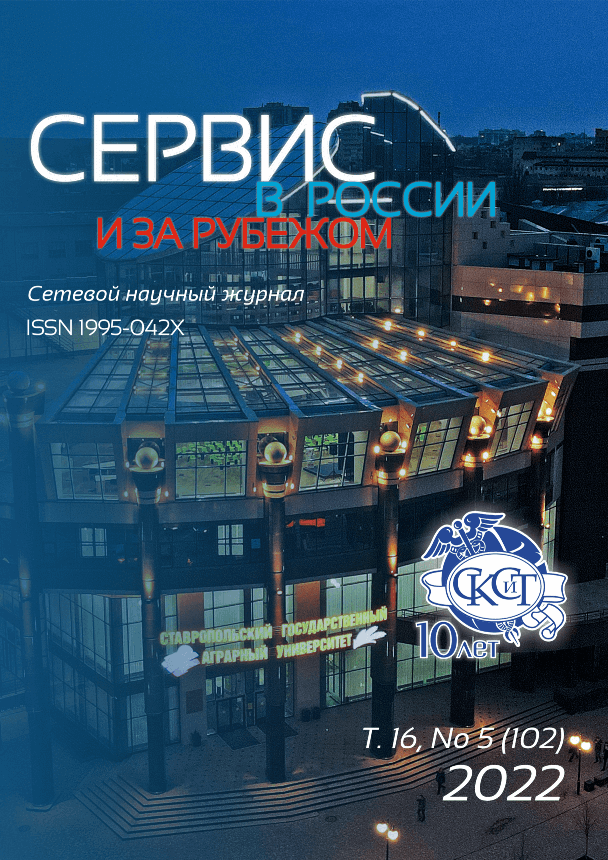Recreation bases in Primorsky Krai: status and development prospects
DOI:
https://doi.org/10.5281/zenodo.7404152Keywords:
recreation center, domestic tourism, recreation, beach, hotel, tourist, tourism infrastructure, society, business, preferencesAbstract
The article is devoted to the actual problem of regional development of recreation centers, analysis of the current state of enterprises and the formation of a portrait of the consumer, his or her needs and requirements for living conditions. The study considers statistical data that determines the number of recreation centers, campsites and other recreation enterprises in Russia from 2010 to 2021 and the number of tourists living in them. To determine the main content of the principles for the development of domestic tourism and the preferences of tourists when choosing recreation centers in Covid-19 pandemic, the authors study the results of scientific works of domestic and foreign authors. The results of economic and social indicators in the tourism and hospitality industry in Primorsky Krai are analyzed for a conditional example of the stimulating effect of tourism on related sectors of the economy. The analysis is based on data on the arrival of tourists, the number of collective accommodation facilities, income and expenses of enterprises in the period from 2002 to 2021. In addition to a significant decline in all tourism parameters, which is in line with global trends, the results of our study show changes that have occurred in terms of spatial distribution of tourists, average length of stay, organization of arrival, age, type of holiday, used housing, according to available data. It was recognized that the development of recreation centers in the region based on the classification system of hotels and other accommodation facilities is proceeding slowly. Comfort, quality and focus on consumers who have previously vacationed in other countries and expect the same, this development vector is not yet available for the region. Instead of striving for recreation centers to develop as they are now, the authors propose to reconsider the mechanism of regulation and participation of business, government and educational institutions in increasing the tourist attractiveness of Primorsky Krai, taking into account the results of the study.
Downloads
References
Анисимова В.В. Оценка доступности баз отдыха на территории Краснодарского края // Современные проблемы сервиса и туризма. 2016. №1(10). С.148-155.
Ахремчик Д.В. Туристическая отрасль в новых экономических условиях – поиск новых возможностей и направлений // Экономика, предпринимательство и право. 2022. №6(12). С. 1781-1790. doi: 10.18334/epp.12.6.114888.
Киселев С.П. Адаптация предприятий гостиничного бизнеса в условиях внешних вызовов // Вестник РУК. 2022. №2(48). С 27-31.
Кобяк М.В., Ильина Е.Л., Латкин А.Н., Валединская Е.Н., Астафьева О.А. Влияние пандемии COVID-19 на мировой туризм: трансформационный потенциал и последствия для устойчивого восстановления // Экономика, предпринимательство и право. 2022. №2(12). С. 679-696. doi: 10.18334/epp.12.2.114208.
Минясян И.А. Функциональные особенности туристских баз в историческом развитии // Прорывные научные исследования как двигатель науки. 2017. С. 157-159.
Павленко И.Г., Остовская А.А., Нагиев Мирага Адил Оглу. Влияние ФЦП «Развитие внутреннего и въездного туризма в Российской Федерации (2019–2025 годы)» на развитие сервиса и туризма // Геополитика и экогеодинамика регионов. 2021. №7(17). С. 48-57.
Павленко И.Г. Система управления качеством гостиничных услуг // Сервис в России и за рубежом. 2019. №5(87). С. 36-42.
Павленко И.Г., Нестеренко В.Ю. Инструментарий эффективного использования туристско-рекреационного потенциала // Вестник ОрелГИЭТ. 2018. №1(43). С. 167-170.
Скоробогатова Т.Н., Павленко И.Г., Килина А.С., Кендзерская Н.В. Предпосылки формирования мобильных приложений как средства продаж туристских услуг // Геополитика и экогеодинамика регионов. 2021. №7(17). С. 335-343.
Яньшин В.Д., Галенко Е.В. Сравнительный анализ баз отдыха в Приморском крае // Новая экономика, бизнес и общество: Мат. Апрельской науч.-практ. конф. мол. уч. Владивосток: Дальневосточный федер. ун-т, 2021. С. 1244-1252.
Libre A., Manalo A., Saktian Laksito G. Factors Influencing Philippines Tourist’ Revisit Intention: The Role and Effect of Destination Image, Tourist Experience, Perceived Value, and Tourist Satisfaction International // Journal of Quantitative Research and Modeling. 2022. Vol.3. №1. Pp. 1-12.
Derkacheva L.N., Kosolapov A.B., Galenko E.V., Makartseva E.V. Sea tourism in the southeast of Russia: status and trends of development // International review of management and marketing. 2016. Vol.6. Iss.4. Pp. 673-676.
Duan Peili, Cao Yanying, Wang Yeqiao, Yin Peng. Bibliometric Analysis of Coastal and Marine Tourism Research from 1990 to 2020 // Journal of Coastal Research. 2021. Vol.38. DOI: 10.2112/JCOASTRES-D-20-00171.1.
Sulc I., Fuerst-Bjeliˇs B. Changes of tourism trajectories in (post) covidian world: Croatian perspectives // Research in Globalization. 2021. Vol.3. 100052. DOI: 10.1016/j.resglo.2021.100052.
Kanga S., Meraj G., Majid Farooq S., et al. Analyzing the Risk to COVID‐19 Infection using Remote Sensing and GIS // Risk Analysis. 2021. Vol. 41. Pp. 801–813. doi: 10.1111/risa.13724.
Liu W., Cao Z. Positive Role of Marine Tourism on Economic Stimulus in Coastal Area // Journal of Coastal Research. 2018. Vol.83. Pp. 217-220.
Mursalina M., Raja Masbar, Suriani S. Impact of Covid-19 Pandemic on Economic Growth of the Tourism Sector in Indonesia // International Journal of Quantitative Research and Modeling. 2022. Vol. 3, Iss.1. Pp. 18-28. DOI: 10.46336/ijqrm.v3i1.261.
Pascoe S. Recreational beach use values with multiple activities // Ecological Economics. 2019. Vol.160. Pp. 137-144. DOI: 10.1016/j.ecolecon.2019.02.018.
Rajeev Singh Chandel, Shruti Kanga, Suraj Kumar Singh. Impact of COVID-19 on tourism sector: a case study of Rajasthan, India[J] // AIMS Geosciences. 2021. Vol.7(2). Pp. 224-243. doi: 10.3934/geosci.2021014.
Scarlett H.G. Tourism recovery and the economic impact: A panel assessment // Research in Globalization. 2021. 100044.
Gossling S., Scott D., Hall C.M. Pandemics, tourism and global change: a rapid assessment of COVID-19 // Journal of Sustainable Tourism. 2020. Vol.29. Iss.1. Pp. 1-20. DOI: 10.1080/09669582.2020.1758708.
Souza L.H., Kastenholz E., Barbosa M.d.L.A., Carvalho M.S.e.S.C. Tourist experience, perceived authenticity, place attachment and loyalty when staying in a peer-to-peer accommodation // International Journal of Tourism Cities. 2020. Vol.6. Iss.1. Pp. 27-52. DOI: 10.1108/IJTC-03-2019-0042.
Downloads
Published
How to Cite
Issue
Section
License
Copyright (c) 2022 Galenko, E. V., & Ovcharenko, N. P.

This work is licensed under a Creative Commons Attribution-NonCommercial-ShareAlike 4.0 International License.












